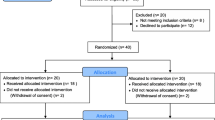Abstract
There is increasing evidence that a greater degree of postictal suppression (the abruptness and magnitude of the EEG voltage drop at the end of the seizure) may be associated with better clinical response to electroconvulsive therapy. Retrospective studies have shown better postictal suppression when propofol is used for induction rather than the more commonly used methohexital. We report two patients in whom poor postictal suppression was rectified by switching from methohexital to propofol. The clinical significance of this improvement in postictal suppression is unclear, and prospective studies will be needed to clarify any clinical benefits.
Similar content being viewed by others
References
Daniel WF, Crovitz HF, Weiner RD, Swartzwelder HS, Kahn EM. ECT-induced amnesia and postictal EEG suppression. Biol Psychiatry. 1985;20:344–8.
Suppes T, Webb A, Carmody T, Gordon E, Gutierrez-Esteinou R, Hudson JI, Pope HG. Is postictal electrical silence a predictor of response to electroconvulsive therapy? J Affect Disord. 1996;41:55–8.
Azuma H, Fujita A, Sato K, Arahata K, Otsuki K, Hori M, Mochida Y, Uchida M, Yamada T, Akechi T, Furukawa TA. Postictal suppression correlates with therapeutic efficacy for depression in bilateral sine and pulse wave electroconvulsive therapy. Psychiatry Clin Neurosci. 1997;61:168–73.
Azuma H, Yamada A, Shinagawa Y, Nakano Y, Watanabe N, Akechi T, Furukawa TA. Ictal physiological characteristics of remitters during bilateral electroconvulsive therapy. Psychiatry Res. 2011;185:462–4.
Abrams R. Stimulus titration and ECT dosing. J ECT. 2002;18:3–9.
Geretsegger C, Nickel M, Judendorfer B, Rochowanski E, Novak E, Aichhorn W. Propofol and methohexital as anesthetic agents for electroconvulsive therapy: a randomized, double-blind comparison of electroconvulsive seizure quality, therapeutic efficacy, and cognitive performance. J ECT. 2007;23:239–43.
Eser D, Nothdurfter C, Schule C, Damm J, Steng Y, Moller HJ, Rupprecht R, Baghai T. The influence of anaesthetic medication on safety, tolerability and clinical effectiveness of electroconvulsive therapy. World J Biol Psychiatry. 2010;11:447–56.
Geretsegger C, Rochowanski E, Kartnig C, Unterrainer AF. Propofol and methohexital as anesthetic agents for electroconvulsive therapy (ECT): a comparison of seizure-quality measures and vital signs. J ECT. 1998;14:28–35.
Walder B, Seeck M, Tramer MR. Propofol versus methohexital for electroconvulsive therapy: a meta-analysis. J Neurosurg Anesthesiol. 2001;13:93–8.
Swaim JC, Mansour M, Wydo SM, Moore JL. A retrospective comparison of anesthetic agents in electroconvulsive therapy. J ECT. 2006;22:243–6.
Martensson B, Bartfai A, Hallen B, Hellstrom C, Junthe T, Olander M. A comparison of propofol and methohexital as anesthetic agents for ECT: effects on seizure duration, therapeutic outcome, and memory. Biol Psychiatry. 1994;35:179–89.
Malsch E, Gratz I, Mani S, Backup C, Levy S, Allen E. Efficacy of electroconvulsive therapy after propofol and methohexital anesthesia. Convuls Ther. 1994;10:212–9.
Conflict of interest
The author has no financial or other conflict of interest pertinent to this work.
Author information
Authors and Affiliations
Corresponding author
About this article
Cite this article
Stewart, J.T. Management of poor postictal suppression during electroconvulsive therapy with propofol anesthesia: a report of two cases. J Anesth 26, 925–927 (2012). https://doi.org/10.1007/s00540-012-1455-x
Received:
Accepted:
Published:
Issue Date:
DOI: https://doi.org/10.1007/s00540-012-1455-x




